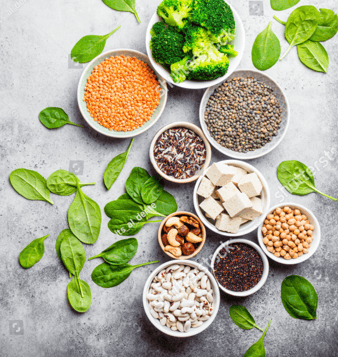 Plant-based foods typically contain fiber, which promotes good gut bacteria, smoother digestion, and, in the case of soluble fiber, better heart health.
Plant-based foods typically contain fiber, which promotes good gut bacteria, smoother digestion, and, in the case of soluble fiber, better heart health.
Research has suggested that a plant-based diet could play a role in cancer prevention. Other studies have shown plant-based eating can be a helpful strategy for weight loss and type 2 diabetes management.
Beyond their advantages for personal wellness, proteins from plants also make a difference for the environment. In terms of land use, freshwater consumption, and greenhouse gas emissions, plant foods have a definite upper hand over animal products.
Drawbacks of plant-based protein
Despite their many benefits, proteins from plants do have some drawbacks.
Though most plant-based choices provide ample amounts of protein, in many cases, they simply can’t compete with the high levels in animal products like beef or chicken.
Similarly, don’t expect plant-based proteins to provide one-to-one levels of micronutrients with animal products. Many have lower amounts of B vitamins, iron, and vitamin D3.
It’s important to note that commercially prepared plant-based proteins are often processed. A diet high in processed foods has been linked to weight gain and a possible increased risk of cancer.
To distinguish your many plant protein options, here’s a look at the various categories:
Plant Protein types:
- Soy-based: tempeh, tofu, edamame, Impossible Burger, soy milk, soy crumbles (textured vegetable protein)
- Bean- or legume-based: lentils, beans and rice, chickpeas, black beans, bean burgers, eggless eggs
- Pea protein-based: Pea protein, pea milk
- Grain-based: seitan, Ezekiel bread, whole wheat flour, spelt, teff
- Nut- and seed-based: almonds, cashews, Brazil nuts, pistachios, chia seeds, flax seeds, quinoa
- Veggie-based: potatoes, sweet potatoes, spinach, broccoli, asparagus
- Other: mycoprotein, spirulina
| Plant-Based Protein | Service Size | Protein |
| Edamame | 1/2 cup | 7 g |
| Pea protein | 1 tbsp | 24 g |
| Lentils | 1 cup, cooked | 18 g |
| Beans and rice | 1 cup, cooked | 12 g |
| Chia seeds | 2 tbsp | 5 g |
| Quinoa | 1 cup | 8 g |
| Chickpeas | 1 cup | 15 g |
| Almonds | 1/4 cup | 6 g |
| Green peas | 1/2 cup | 4 g |
| Seitan | 1 oz. | 21 g |
| Tofu | 3 oz. | 8 g |

